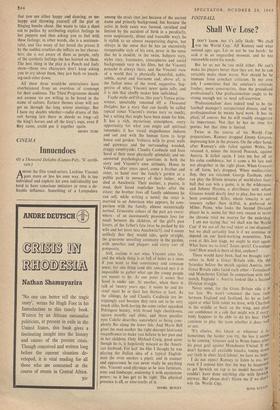CINEMA
Innuendoes
AMONG the film trend-setters, Luchino Visconti goes more or less his own way. He is too individual and exploits his own individuality too hard to have conscious imitators or even a de- finable influence. Something of a Lampedusa among the mods (not just because of the ancient name and princely background, but because the artist in both cases was formed, enriched and limited by the accident of birth in a peculiarly, even suspiciously, direct and traceable way), he is stylish to an almost exasperating degree, but always in the sense that he has an excessively recognisable style of his own, never in the sense that he is modish, in the swim. Subjects vary, styles vary, treatments, atmospheres and social backgrounds vary in his films, but the Visconti panache is always there, and the Visconti view of a world that is physically beautiful, noble, subtle, secret and fearsome and, above all, in the Italian sense of the word, suggestive. Sug- gestive of what, Visconti never quite tells; and it is this that chiefly makes him individual.
Vaghe stelle dell'Orsa, this year's Venice prize- winner, unsuitably renamed Of a Thousand Delights, has a story that can hardly be called typical (since Visconti's stories vary 'so much), but a setting that might have been made for him. It has a rich, mysterious atmosphere, every opportunity for what you might call spiritual innuendo; it has visual magnificence indoors and out and with the human form (a large house and garden; Volterra with its great walls and gateways and the surrounding wooded, craggy countryside; Claudia Cardinale and Jean Sorel at their most physically splendid); and un- answered psychological questions in both the story and Visconti's own attitudes. Home to Volterra, after years apart, come a brother and sister, to hand over the family's garden as a public park in memory of their father, who died at Auschwitz. Their mother, a pianist, is mad, their hated stepfather looks after the estate; the brother lives off family oddments he can sell, while writing a novel; the sister is married to an American who appears, by com- parison with the family, almost eccentrically normal. Gruesome echoes of the past are every- where: of an incestuously passionate love (or need) between the children, of the girl's past lovers, of the father's fate (was he pushed by his wife and her lover into Auschwitz?); and it seems unlikely that they would take, quite straight, the gruesome unveiling ceremony in the garden, with speeches and plaques and every sort of pomposity.
Still, realism is not what Visconti aims for, and the whole thing is as full of holes as a sieve if you want to find consistency and common sense; for one thing (and this annoyed me) it is impossible to gather what age, the young people are meant to be. At one point it seems that Sorel is under age. At another, when there is , talk of 'twenty years ago,' it seems he and his sister must be in their late thirties at least. As the siblings, he and Claudia Cardinale are in-
triguingly cast because they turn out to be very much alike, both having the same rather squashed Pekingese beauty, with broad high cheekbones, square mouths and chins, and those peculiar eyes Colette describes somewhere as being com- pletely flat along the lower lids. And Marie Bell gives the mad mother the right decrepit histrionic magnificence to make you believe in her past and in her children. Only Michael Craig, good actor though he is, is hopelessly miscast as the Ameri- can husband. For half the film I thought he was playing the Italian idea of a typical English- man (he even smokes a pipe); and in manner and appearance he can never really be anything else. Visconti used physique as he uses furniture, trees and landscape, endowing it with mysterious power; so it has got to be right. The physical presence is all, or nine-tenths of it.
ISABEL QUIGLY






































 Previous page
Previous page